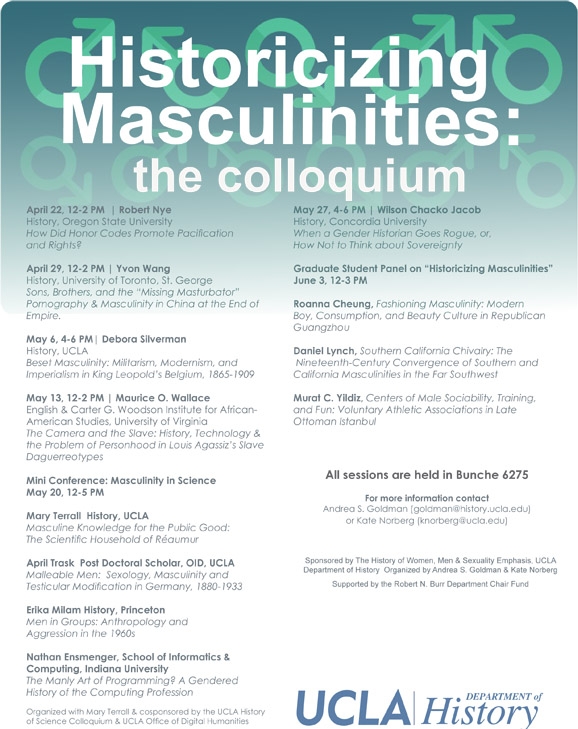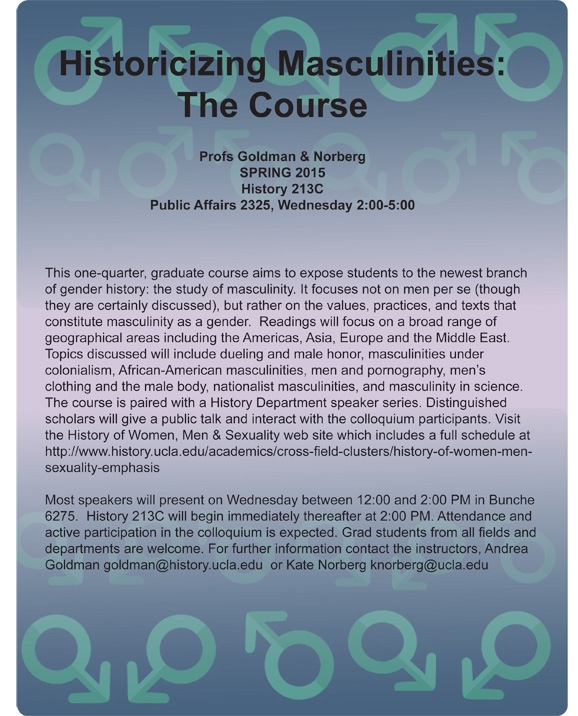HWMS 2014-2015 Archive
NOTE: THIS IS AN ARCHIVE OF HWMS EVENTS AND COURSES FROM 2014-2015.
—–
HWMS EVENTS FOR 2014-2015
SPRING 2015
Colloquium: Historicizing Masculinities
Wednesdays 12-2, Bunche 6275

During spring quarter 2015, the History of Women, Men and Sexuality will offer a speakers’ series entitled “Historicizing Masculinities.” Our goal is to expose the UCLA community to the newest branch of gender history: the study of masculinity. The colloquium focuses not on men per se (though they are certainly discussed), but rather on the values, practices, and texts that constitute masculinity as a gender. Topics addressed will include, masculinity under colonialism, the history of the duel, masculinity and pornography, African-American soldiers during the Civil War, the construction of masculinity by the social sciences in the1960s, and the masculinization of the computer industry between 1970 and the present. A graduate course (History 213) will be offered simultaneously. Currently invited speakers include Nathan Ensmenger (University of Indiana), Wilson Chacko Jacob (Concordia University), Erika L. Milam (Princeton University), Robert Nye, (Oregon State University), Maurice Wallace (University of Virginia), and Y. Yvon Wang (University of Toronto). A special mini-conference devoted to masculinity and science co-sponsored by the History of Science field and organized with Professor Mary Terrall will occur on May 20.
HWMS COURSES

The History of Women, Men and Sexuality Emphasis offers courses for both undergraduate and graduates students interested in studying gender and sexuality in the past. For undergraduates, a two quarter upper-division sequence (History 187A & B) provides students with a basic knowledge of the history of gender and sexuality from prehistory to global feminisms in cultures around the world. Upper-division seminars and lecture courses taught within the History department’s geographical fields allow students to pursue their interests in greater detail.
For graduate students, HWMS sponsors the HWMS Graduate Seminar (History 213 A-B) which is offered annually or semi-annually.
Undergraduate Courses
Fall 2014
History 191D-2: Who Cares about Inequality?
Wed 3:00-5:50, Royce 166
Prof. Yeager
This course investigates how, why and when particular inequalities have taken hold in different societies. It identifies four distinctly different epochs of global inequality, stretching from (1) the pre-industrial years to the 1820s (2) the long nineteenth century from the 1820s to WWI, (3) the unstable years between the two World Wars, and (4) the second half of the 20th century. Students will read articles that enable them to identify, situate and evaluate the history of American inequalities within this larger global framework. Students will apply a variety of conceptual tools, including moral philosophy, feminist theories of value, utilitarianism, and the human development index.
Mon & Wed 4:00-6:00, Haines A18
Prof. Megan Gallagher
This course will survey a selection of major works in feminist political theory from the early modern period to the present. As a discipline, political theory concerns itself with questions of authority, fairness, justice, and power (among others); yet historically, women’s interests have been routinely ignored or subordinated to those of men. Feminist political theory challenges women’s absence, or assumed subservience, in political life. It seeks to provide a philosophical foundation for the pursuit of “real world” goals and the improvement of women’s lives––and, often times, men’s as well. In doing so, feminist theory’s primary method has entailed critical engagement with the western canon of political philosophy. Nonetheless, feminism has always been motivated by a concern for inequality and injustices in everyday life.
Yet feminist political theory is not monolithic – there are many diverse and conflicting strands, based in disparate notions of what constitutes “the good life.” Liberal feminism, conservative feminism, radical feminism, marxist feminism, women of color feminism, Chicana feminism, queer feminism, continental feminism, existentialist feminism: these varieties, and others, introduce different concerns into debates over the relationship between the public and the private; the variety of possible relationships between men and women; the complex interplay between sex, gender, and the body; the roles of class and race and how they interact with gender; to say nothing of what unifies and complicates the category of “woman.”
Because feminism understands itself to be fundamentally liberatory (that is, concerned with increasing liberty, specifically of women), our readings will focus on the theme of freedom. Specifically, we will consider 1) what it means to be a free political actor, 2) whether freedom is the highest political good, 3), whether, and how, freedom is compatible with other values, such as equality and justice, and 4) how different forms of government and political structures contribute to, or detract from, attempts to increase freedom.
Winter 2015
–
Spring 2015
Tue & Thur 12:30-1:45
Prof. Ellen Dubois
GRADUATE COURSES
Fall 2014
–
Spring 2015

